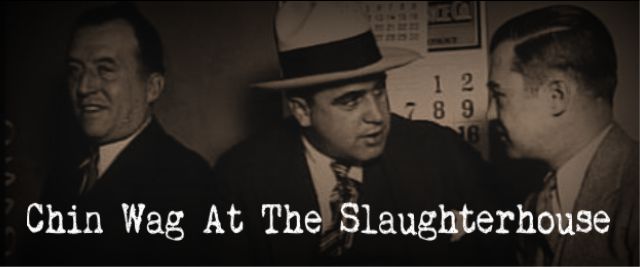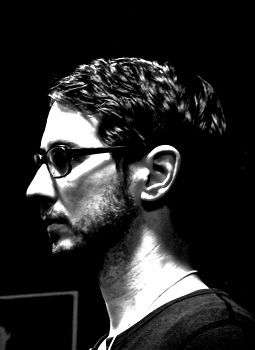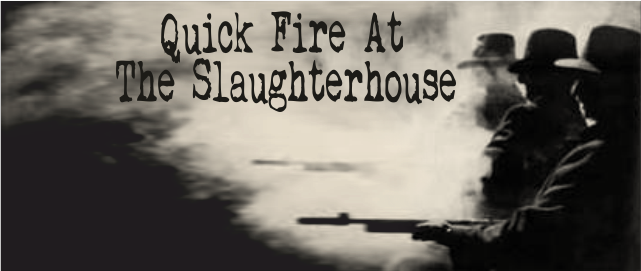
Nik Korpon is the author of Stay God, Sweet Angel and numerous stories. He writes Noir, he writes transgressive prose that digs into alienation. He is an assistant editor with Dark House Press. He lives in Baltimore. Nik met me at The Slaughterhouse, where we talked about his novel and the sub-genres of Noir.
How central is identity to your novel Stay God, Sweet Angel?
 Identity plays into almost everything I write. In Stay God, Sweet Angel, it’s the literal centerpiece of it, as the guy not only uses a Baltimore pawn shop as a drug dealing front, but he also assumed a different name on fleeing some bad business up in Massachusetts. There are also an assortment of people who might or might not be who they say they are.
Identity plays into almost everything I write. In Stay God, Sweet Angel, it’s the literal centerpiece of it, as the guy not only uses a Baltimore pawn shop as a drug dealing front, but he also assumed a different name on fleeing some bad business up in Massachusetts. There are also an assortment of people who might or might not be who they say they are.
Actually, let me take that back. I think the more accurate thing to say would be that appearances–if not personal identity explicitly–fascinate me, how we present ourselves to each other. Crime fiction is kind of built off that, but the tension between personal interiors and exteriors, who we choose to be to which people, all of that gives a writer so much to play with.
I remember seeing Dateline or 20/20–I think it was 20/20, because it came on Friday night after the X-Files back in the 90s–about this grandfather who had been sentenced to forty years in jail for something like fifty robberies. They interviewed him a couple times and, obviously, he looked like a grandfather, very soft-spoken and mild-mannered and whatnot, but what really struck me was the interviews with his victims. Every last one of them said how nice he was, and that he’d make sure the ropes weren’t too tight, or put a pillow beneath someone so they were comfortable. A couple people even gave him extra money because he was so nice. But still, the guy was taking tens of thousands of dollars worth of stuff. It’s not the most extreme example of interiors and exteriors–and especially not when I was at the age where all I watched was Nightmare on Elm Street and Godfather–but something about that dissonance has stuck with me for twenty years.
Do you think within Noir there is a sub-genre of a Noir literature of alienation?
You mean characters alienated from society, or something along those lines? I definitely see that. I mean, just by definition–or one of the definitions–noir is about the downtrodden, the outcast, the forgotten. Fiction about losers, is what I think Otto Penzler called it. It’s about the cogs on which the clock runs, not the actual clock. So those people are bound to feel alienated and lash out accordingly. Plus, if a character has nothing tethering them to society, there’s nothing to keep them from sinking and sinking and sinking.
I think it’s really interesting to watch people flip that alienation on it’s head though, and where most noir characters are lone wolves (wolfs? can you have multiple “lone”? I digress…) you instead see characters that are constantly surrounded by people, to the point of claustrophobia. It’s hard to pull some nefarious shit with a lot of onlookers. Somewhat related: I’d avoided using technology in stories for a really long time because I thought it hurt the aesthetic of the world. Calling someone on a mobile isn’t nearly as cool as finding a payphone, yeah? Then I read a few books (or, being honest, probably watched a couple TV shows) where they used cell phones extensively and I was completely converted, because they made it so much harder for characters to achieve their goal. The phones became the all-seeing eye. Plus there was the possible drama of meeting a supplier at a diner table to set up some deal while your hand was under the table, texting all the details to your partner to rip-off the supplier. Stuff like that. They became a socially acceptable form of Big Brother.
That went way off topic…
How important is redemption in your writing?
Much more important now than it used to be. When I first started writing crime and noir, I was trying to outdo everything I’d read. Make it darker, more visceral, more lyrical. That was fun for a while but it started to wear on me as I got older, and as I read more. I still like things to be dark and fucked up–probably because I write largely about love and families, which are both dark and fucked up–but I prefer to have some glimmer of hope at the end. That doesn’t necessarily mean a character needs to be redeemed, but I like for them to be moving toward it, even if they fail. All of this is probably a function of me getting older, having kids and whatnot. I don’t need, or want, everything to be gloom and doom all the time. If I want unrelentingly depressing shit, I can watch the news.
I think this was probably my bone with True Detective, though I did enjoy the show a lot, and it’s why I tend to gravitate more toward stories like Justified, The Americans, Breaking Bad, things like that. There’s still a lot of bad stuff happening, but there’s a very human element to the story. With True Detective, Ligotti, all the anti-natalist theory and whatnot, the cynicism became overwhelming and made the story part of my brain shut down, or at least stop paying attention. I mean, I was raised Catholic; I’ve already got enough residual guilt weighing me down (and, like many Catholics I know, have later become a practicing Buddhist).
That’s not to say that I believe solely in happy endings. In the same way that I’m turned off by completely depressing endings, I don’t think anyone walks away from a dramatic incident unscarred. Most of my endings are somewhere in between, where the character has (usually) overcome the obstacle (mostly), but whether they survive in the long-term is still unclear. Which, to me, is the most honest ending.
Who are your literary influences?
They’ve changed over the years. The Outsiders was my favorite book for about ten years when I was young, along with some Stephen King. When I first started writing, probably in my early 20s or so, I was all about Irvine Welsh, Chuck Palahniuk, Nick Hornby, F, Scott Fitzgerald and the Beats, especially The Subterraneans by Kerouac. I loved that book desperately. Actually, I haven’t reread it in probably ten years, mostly because I don’t want to taint the way I remember it. I drank wine out of the bottle and wrote these overwrought faux poems and an abortion of a novel. All of my writing was terrible then. Hasn’t gotten much better now but…
Once I started to get serious about writing (and I’m not saying those people aren’t serious writers, just that my tastes changed) the three biggest books for me were Kiss Me, Judas by Will Christopher Baer, Dermaphoria by Craig Clevenger, and Chronicle of a Death Foretold/100 Years of Solitude by Gabriel Garcia Marquez. Pretty much anything in Macondo, actually. I read everything Gabbo wrote, save Melancholy Whores, in about six months. Dermaphoria was a big one for me, because just as Palahniuk and Welsh redefined for me what books could be as a reader, Derma blew open what you could do as a writer. I also read it right before starting grad school, so it came at a pivotal time for me. The Baltimore of my writing is directly taken from Gabbo’s Macondo, in that most of the stories are in the same world and characters pop up in various stories and novels. And Baer, I could listen to his words instead of music.
As I got more into crime fiction, I found James M. Cain, specifically Postman, and that changed everything again. The doomed lovers, the inevitability bearing down on them, that opening line. I’ve been trying to write that book for eight years and still can’t get it right. Cain led me to Jim Thompson, who inflicted his stories on me for a couple years. I worked my way through a lot of the golden-era writers up to contemporary stuff, people like Megan Abbott, Lehane, Don Winslow, Gillian Flynn, Woodrell, Tana French. I don’t think there’s hard and fast evidence of their influence on me, but it’s filtered through. I can hear it even if no one else can.
More recently, I’ve been reading a lot of “mountains crime,” for lack of a better term (I always think rural noir sounds condescending), guys like Ben Whitmer and Wiley Cash, and crime from Northern Ireland, Gerard Brennan and Stuart Neville. Kind of a weird mix, but it fits somehow.
And it’s not explicitly literary, but I read a lot of teleplays over the last year before writing a few TV and film scripts (all spec, unfortunately), and it has started informing my novel-writing. For one, you track through one “story” a hell of a lot quicker than reading a novel, and two, the screenwriter has already stripped away all the bullshit so you can see story and story only. It’s incredibly helpful because you start to see how scenes and sequences are put together, watch dialogue and action play against one another, see only what’s essential to the narrative, then apply that to prose. I mean, you see all that in books, but I’m not a terribly smart guy so it’s helps me to have it laid bare like that.
Do you think too much crime fiction sanitises crime?
I think it’s hard to get it right. As many books sanitize crime as glorify and revel in it. I’m not sure which is worse. Glossing over it robs the scene of its impact, but blood and gore for the sake of blood and gore pulls you out of the story too. Unless it’s particularly campy and that’s all part of the fun, like that scene in Hatchet where you can actually see the lip of the bucket as they’re throwing blood on the tree. I’m pretty forgiving with violence, as long as it’s honest, but I prefer to read, and write, emotional violence than physical violence. What’s that Thuglit line–Think clever, not cleaver or something like that? A broken glass at a dinner table can be more dramatic than a chainsaw if it’s used properly.
Graham Greene wrote, ‘There is a splinter of ice in the heart of a writer.’ What do you make of his observation?
Possibly that writers should be somewhat cold? I’m not sure. I think it’d be hard for someone to write if they don’t have some kind of interest in other people, empathy or something along those lines. I don’t know if you have to actually enjoy people to be a great writer–I tend to be introverted, so I hope you don’t have to–but an interest in what makes people tick is helpful.
What do you make of the e-book revolution?
It’s great. It’s given all of these emerging authors a chance to get their books out and be heard. It’s also allowed a number of great micropresses to start publishing work of these writers who are unknown but exciting as hell to read. Same with all of the great magazines that have popped up over the last five years. All of the talk about ebooks rendering print obsolete and whatnot is a bunch of horseshit, to my mind. A lot of people still prefer paper over digital, and will continue to buy paperbacks.
What the ebook revolution did was give more flexibility to readers and possibly attract newer, more tech-savvy readers (though I don’t mean that in a condescending way). I don’t have a ton of spare time, so having a Kindle app on my phone lets me sneak in some extra reading when I have twenty minutes. I’d still prefer to lay in my hammock with a beer and read an entire book, but beggars and choosers, you know? Still, despite having a Kindle app and a Kindle, most of what I read is still paperback.
From the publishing side, I think the next logical step in ebooks–and it’s something some indie presses are doing, as well as some indie music labels–is to package a digital download with a physical copy. I’ve picked up a bunch of records that have a code for a free digital download, and it makes the most sense because it allows people to have the record wherever they go. Same with books. There’s no reason not to do it, other than trying to make an extra couple bucks of people. In the end, it hurts the readers and the writers most.
How important is personal struggle to your writing?
It’s probably one of the most important things of the book. If your characters don’t have to struggle for anything, there’s no drama, no reason to keep reading (or writing, for that matter). One of the things I constantly worry about is how much struggle is too much. I never want it to be easy for a character to reach their goal–and I’m always looking for ways to make their life harder–but finding that sweet spot between drama and grinding-doom is tricky. I’ve always admired writers like Stephen Graham Jones and the Breaking Bad writers who constantly write themselves into a corner then manage to find their way out without it being ridiculous. I don’t know if I ever quite hit that mark.
What advice would you give yourself as a younger man?
I’d tell a younger me a couple things:
-No, it’s not good enough yet. Have another crack.
-Yes, someone’s written a story like that before, but it’s okay. Do it different and do it better.
-No, your life is not going to end if you don’t get this story/novel/screenplay picked up somewhere. Write another one and make it better this time.
-Yes, the writing life can be cruel, lonely, self-defeating, and full of misery.
-No, you can’t quit. Give it ten minutes and you’ll write a great sentence or have a great conversation at a reading and everything will be fine again.
-Yes, by all means, write a story you think is interesting and is fun to follow. That’s the whole point, yeah?
-No, it doesn’t have to be “noir as fuck,” whatever that means.
-Yes, you can practice you signature for that four-book deal that will allow you to quit one of your jobs. Just don’t leave the cap off the pen. It might be a while.
If you could choose a film-world to live inside, which would you choose?
I’m probably going to lose punk points for this, but it’s a split between Inception and Amelie, which, yeah, are pretty damn far apart. Something about the immersive world of Inception, the set decoration, the aesthetic of it, it really hit me. There are problems with the film, sure, but the world itself is beautiful. And strangely enough, I wrote the novella that became The Boys From County Hell, a sci-fi novel featuring memory thieves and Billie Holliday I just finished, right before I saw Inception. So I was doubly pissed to see dream thieves and Edith Piaf done amazingly well on the screen.
Same way with Amelie, but in the totally opposite direction. Everything is so whimsical and grease-smeared, and with the wet cobblestones and the organ grinder music going on in the background, hits some Francophile chord in me. Doesn’t hurt that I’ve been planning on marrying Audrey Tautou for the last fifteen years…
Thank you Nik for an informative interview.
‘Stay God, Sweet Angel’ can be found at Amazon US and UK
See all Nik Korpon books at his US and UK Amazon author pages
Find Nik at Goodreads, Facebook, and Twitter @nikkorpon
And of course you are invited to visit his “occasionally updated homepage,” here.


















